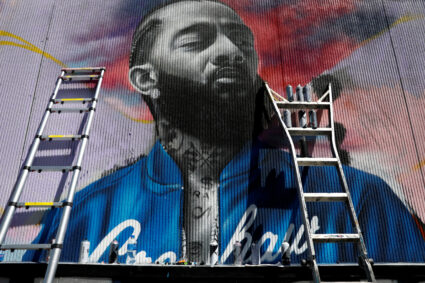
A largely unexplored area of Indonesia may be home to the oldest rock art studied so far, dating back to…

LOS ANGELES (AP) — A Los Angeles judge on Wednesday sentenced the man convicted of gunning down rapper Nipsey Hussle to 60 years to life in prison.
Superior Court Judge H. Clay Jacke II handed down the of-delayed sentence to Eric R. Holder Jr., 33, who was found guilty of the 2019 first-degree murder of the 33-year-old Grammy-nominated hip-hop artist outside the clothing store Hussle founded, the Marathon, in the South Los Angeles neighborhood where both men grew up in very similar circumstances.
After the monthlong trial, jurors in July also convicted Holder of two counts of attempted voluntary manslaughter and two counts of assault with a firearm for gunfire that hit two other men at the scene who survived.
Superior Court Judge H. Clay Jacke handed down the sentence Wednesday after hearing from one of Hussle's friends and listening to a letter from Holder's father that was read in court. Holder, dressed in orange jail attire, stared straight ahead throughout the proceedings and did not react when the sentence was read.
Holder was not eligible for the death penalty. He was nearly certain to get a sentence that would guarantee he would spend the rest of his life in prison, with only the details of his term in question.
The sentencing has been delayed in part so defense attorney Aaron Jansen could argue to reduce Holder's conviction to manslaughter or second-degree murder, which Jacke rejected in December.
WATCH: How rapper Nipsey Hussle gave back to the community that raised him
Hussle, whose legal name is Ermias Asghedom, and Holder had known each other for years growing up as members of the Rollin' 60s in South LA. Both were aspiring rappers. But Holder never found the same success as Hussle, who would become a local hero and a national celebrity.
Actor Lauren London, who was Hussle's partner and the mother of his two young children, did not attend any part of the trial, nor did any of his relatives, and none are expected to give victim impact statements, as often happens at such hearings.
Herman "Cowboy" Douglas, a close friend of Hussle who was standing with him when he was killed and testified during the trial, told the court that the killing was a tremendous loss both for him personally and for the South Los Angeles community where Hussle was a business leader and an inspiration.
"Nipsey was my friend, he was like a son, he was like a dad," Douglas said. "Our community right now, we lost everything, everything we worked for. One man's mistake, one man's action, messed up a whole community."
Douglas told the judge, "I don't care what you give this guy. It ain't about the time. I just want to know why. The world wants to know why. Why someone would do that?"
The evidence against Holder was so overwhelming — from eyewitnesses to surveillance cameras from local businesses that captured his arrival, the shooting and his departure — that his attorney conceded during trial that he had shot Hussle.
But Jansen argued to jurors that the heated circumstances of the shooting meant a lesser verdict of voluntary manslaughter was merited.
The jury returned with the first-degree murder verdict after about six hours of deliberations.
Jansen said afterward that he was "deeply disappointed" in the verdict, which they planned to appeal.
He did manage a minor victory for Holder by securing the attempted voluntary manslaughter convictions where prosecutors had sought attempted murder verdicts.
A year after his death, Hussle was mourned at a memorial at the arena then known as Staples Center, and celebrated in a performance at the Grammy Awards that included DJ Khaled and John Legend.
Sustain our coverage of culture, arts and literature.